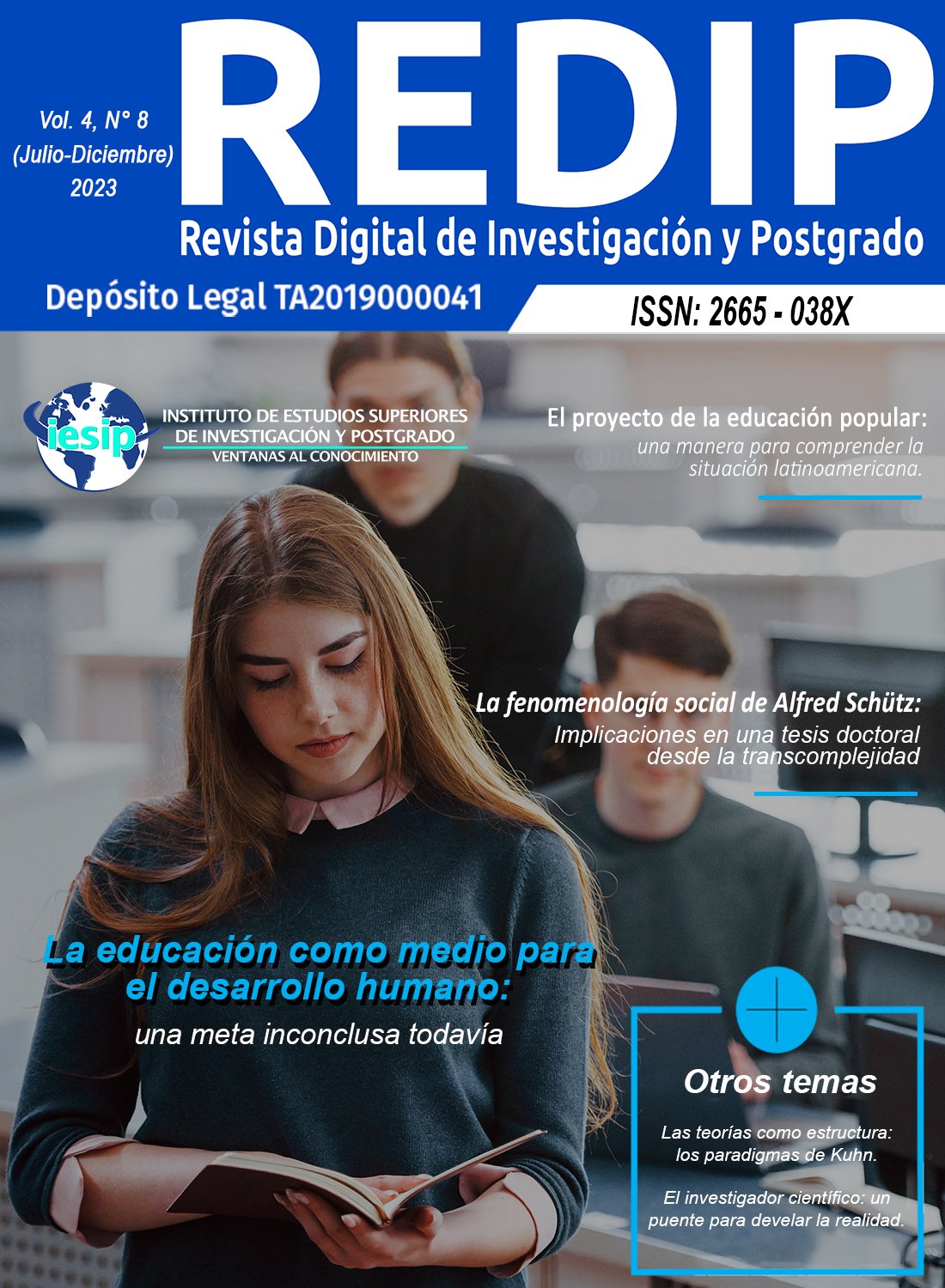Cognitive dimensions of research competencies
DOI:
https://doi.org/10.59654/fvaq7b79Keywords:
Dimensions, competences and research.Abstract
The changes and transformations that globalisation has generated in pedagogy have forced universities to redesign their educational models, directing their functions towards a more committed training that is capable of solving the problems of the social environment and its permanent dynamics, training people with a high level of effectiveness and self-confidence. The aim of this paper is to analyse the theoretical elements that support the cognitive dimensions of research competences. The objective set and the methodology designed allow us to determine that competences in higher education should be aimed at transforming the teaching-education process, from a theoretical-practical perspective, by means of which the teaching process turns and manages to place professional training in a political, economic, social, technological, environmental and legal context, with the intention of achieving a more integrated training of future professionals. It is concluded by stating that the teacher-researcher from his or her discipline must favour the incessant habit of the unknown, as the research process is not a subject, a process that must break the old school myth that research is something impossible to achieve and/or demonstrate so that teachers understand the intrinsic need to be researchers necessarily.
Downloads
References
Academia Nacional de Ciencias de Estados Unidos (2000). Cómo Aprende la Gente
Cerebro, Mente, Experiencia y Escuela. https://eduteka.icesi.edu.co/pdfdir/ComoAprendeLaGente.pdf
Azuaje, L y González, M. (2018). Reflexiones sobre la epistemología, axiología y ontología de la investigación docente. Revista CIEG, 33, pp. 251-259. https://www.grupocieg.org/archivos_revista/Ed.%2033%20(251-259)-Azuaje%20Leomary-Gonzalez%20Marbelis_articulo_id403.pdf
Bolívar, A. (2002). La evaluación de Valores y Actitudes. Edición Grupo Amaya S.A
Cabrera, K y González, L. (2006). Currículo universitario basado en competencias. Ediciones UniNorte.
Marrero, O y Pérez, M. (2014). Competencias investigativas en la educación superior. Revista RES NON VERBA. Edición Especial, pp.55-68. https://biblio.ecotec.edu.ec/revista/edicionespecial/COMPETENCIAS%20INVESTIGATIVAS%20EN%20LA.pdf
Martínez, L. M. y Aponte, P. J. (2007). Axiología y praxiología en la política educativa venezolana: caso Misión Ribas. - Revista Frónesis, 14 (2),38. http://ve.scielo.org/scielo.php?script=sci_arttext&pid=S131562682007000200003
Pérez, R. et al. (2005). Las Competencias Interpretar, Argumentar y Proponer en Química un Problema Pedagógico y Didáctico. Enseñanza de las ciencias, Número extra. VII Congreso.
Rojas, N. (2019). Enseñanza de la competencia investigativa: percepciones y evidencias de los estudiantes universitarios. Revista Espacios, 40(41), p26. http://www.revistaespacios.com/a19v40n41/a19v40n41p26.pdf
Sánchez, R. (1995). Enseñar a investigar, Una didáctica nueva de la investigación en ciencias sociales y humanas. CESU/P y V/UNAM. México.pp.91-125.
Spencer, L. M. y Spencer, S. M. (1993). Competence at Work. New York, John Wiley and Sons.
Tobón, S. (2008). Gestión curricular y ciclos propedéuticos. Editorial ECOE.
Tobón, S. (2009). Formación basada en competencias: Pensamiento complejo, diseño curricular y didáctica (2a. ed.). Ecoe Ediciones. Disponible en: https://www.uv.mx/psicologia/files/2015/07/Tobon-S.-Formacion-basada-en-competencias.pdf
Valdez, J. (2016). Competencias actitudinales. https://jennifervaldezzarate.wordpress.com/2016/05/20/competencias-actitudinales/
Villareal, J. M. (2008). Exige IMS simulacros de evaluación a sus guarderías. www.https://www.hoytamaulipas.net/?PHPSESSID=qqlazydh&v1=notas&v2=78048&t
Downloads
Published
Issue
Section
License
Copyright (c) 2023 Revista Digital de Investigación y Postgrado

This work is licensed under a Creative Commons Attribution-NonCommercial-ShareAlike 4.0 International License.
Esta licencia permite a los reutilizadores distribuir, remezclar, adaptar y desarrollar el material en cualquier medio o formato únicamente con fines no comerciales, y solo siempre que se atribuya al creador. Si remezclas, adaptas o construyes sobre el material, debes licenciar el material modificado bajo términos idénticos. CC BY-NC-SA incluye los siguientes elementos:
![]() POR: se debe dar crédito al creador.
POR: se debe dar crédito al creador.![]() NC: Sólo se permiten usos no comerciales de la obra.
NC: Sólo se permiten usos no comerciales de la obra.![]() SA: Las adaptaciones deben compartirse en los mismos términos.
SA: Las adaptaciones deben compartirse en los mismos términos.











